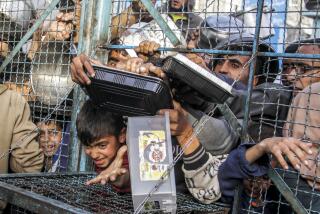Germany Gears Up to Help Feed Soviets : Relief: The emergency effort rides a groundswell of public support.
- Share via
BERLIN — Amid a groundswell of public support, a major German effort was under way Wednesday to send emergency food supplies to the Soviet Union.
The relief program, involving the German federal and states’ governments, more than 10 volunteer agencies and a growing number of private businesses, comes in response to reports that with the onset of winter in the Soviet Union, serious food shortages threaten to cause widespread suffering.
Both Chancellor Helmut Kohl and Foreign Minister Hans-Dietrich Genscher went on national television Wednesday night to urge their compatriots to take part in the assistance program.
“Please help reduce the emergency in the Soviet Union,” Kohl told viewers. “This is an act of charity and above all a work of good neighborliness.”
In his statement, Kohl reminded the Germans that it was Soviet leader Mikhail S. Gorbachev “who, in the most decisive months, helped the Germans achieve their unity.”
With no central distribution or collection points, the size of the emergency effort is difficult to define, although initial signs are that it is already substantial and is likely to grow in the coming weeks.
An official from the Workers Samaritan League, one of the many volunteer organizations involved in the effort, reported Wednesday that in Hamburg alone, more than 100,000 food packages had been prepared for shipment to Leningrad.
“The flood of packages that has come in has completely exceeded our predictions,” the official said.
Actions by German newspapers, magazine publishing houses and television stations have in recent days lifted the effort to the level of a national crusade, each urging its readers or viewers to join in.
“Winter has come early and everything is short--bread, butter, meat and margarine,” a reporter from Second German Television (ZDF) told viewers Wednesday. “We’ll show you how to give and what will happen to your money. We’ll show you how you can help build friendship between Germans and Russians.”
A plea for help made late last week by the mass-circulation tabloid paper Bild Zeitung has already generated an estimated 10,000 packages, according to relief officials, while the Munich-based publishing group Burda announced that it planned to give the equivalent of $300,000 to a campaign launched with its rival weekly Stern magazine.
Kohl on Tuesday dispatched his closest foreign policy adviser, Horst Teltschik, to Moscow to coordinate the arrival and distribution of the food aid and to work with Soviet authorities to assure that it reaches those most in need.
Although the Soviets immediately established a coordinating center for the aid with representatives from no fewer than 15 government ministries, Teltschik emerged from a meeting with Gorbachev on Wednesday confident that the distribution could be carried out in a fair and orderly manner.
“We’ve got the impression from the Soviet side that there is an awareness of the problems that need to be resolved,” Teltschik said.
In addition to German federal government help, several German state governments have set aside funds to pay for transporting and distributing food packages, valued at up to $60 each.
The extensive assistance effort is filled with historical ironies.
The German branch of the American organization CARE, which may end up coordinating much of the current program, was itself founded in the aftermath of World War II to send food to Germany and other European countries devastated by the conflict.
CARE, which originally stood for Cooperative for American Remittances to Europe, later changed that last word to Everywhere.
It is also likely that some of the German food to be shipped eastward might be drawn from the huge food stocks stored in Berlin in case the Soviets attempted a repeat of the 1948-49 blockade of the city.
According to Berlin city government officials, supplies valued at $450 million are still stored in the city--including 120,000 tons of grain, 33,000 tons of dried meat and 10.9 million cans of sardines.
The German relief effort also carries deeper meanings.
Some politicians here have hailed the extent of the response as a symbol of reconciliation between Germans and Russians--who between them lost 30 million dead in World War II.
In interviews, many older Germans also said they see the aid program as a chance to help a people in need in much the way they themselves received food packages to get through their first postwar winters.
However, there is also more than pure goodwill behind the German emergency aid. With the prospect of mass suffering also comes the potential for a flood of refugees that could threaten the stability of the entire region.
So far this year, Germany has already provided the Soviet Union more than $13 billion in direct aid, including $220 million in credits for emergency food supplies.
The Germans also have provided Moscow with a $1.9-billion, interest-free loan to help meet the cost of maintaining Soviet forces in the former East Germany over a fixed four-year withdrawal period.
The 380,000 Soviet troops in Germany will be pulled out in phases to ease the impact that returnees will have on Soviet housing and jobs. Reports have said that morale is low among the low-paid Soviet troops and that some have taken to dealing in black market goods to make ends meet. Moscow has admitted that at least 80 soldiers have defected this year in eastern Germany.
More to Read
Sign up for Essential California
The most important California stories and recommendations in your inbox every morning.
You may occasionally receive promotional content from the Los Angeles Times.













